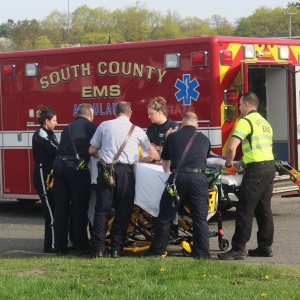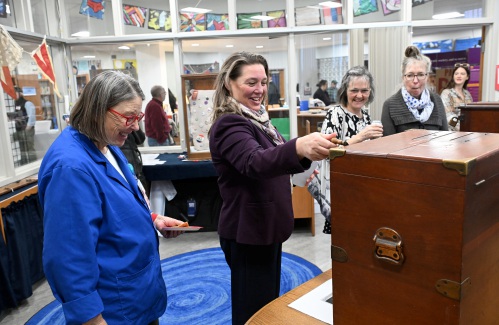
New signs installed along Montague City Road to protect turtles
MONTAGUE — Turtle crossing season is in full swing, and new signs along Montague City Road are urging drivers to take it slow and steady, so the turtles can win their race.

With traditional dances, Rowe Elementary students engage with Indigenous culture
ROWE — After spending the past few weeks educating themselves about the history and culture of Native American tribes in New England, students at Rowe Elementary School culminated their learning by participating in a few traditional dances.
Most Read
 Athol man to serve five to seven years on child abuse charges
Athol man to serve five to seven years on child abuse charges
 Northfield man dies in Erving motorcycle crash; Bernardston man injured in Deerfield crash
Northfield man dies in Erving motorcycle crash; Bernardston man injured in Deerfield crash
 Rafters rescued from Deerfield River in Charlemont
Rafters rescued from Deerfield River in Charlemont
 No injuries from school bus, recycling truck collision in Gill
No injuries from school bus, recycling truck collision in Gill
 Nationwide, beekeepers report loss of 1.6M colonies in 10 months
Nationwide, beekeepers report loss of 1.6M colonies in 10 months
 Conway barn destroyed in blaze likely caused by lightning strike
Conway barn destroyed in blaze likely caused by lightning strike
Editors Picks
 Greenfield Police Logs: April 7 to April 13, 2025
Greenfield Police Logs: April 7 to April 13, 2025
 Athol man to serve five to seven years on child abuse charges
Athol man to serve five to seven years on child abuse charges
 Conway Historical Society to explore ‘forgotten Founding Father’ Joseph Hawley
Conway Historical Society to explore ‘forgotten Founding Father’ Joseph Hawley
 Two longtime public servants vying for Selectboard seat in Northfield
Two longtime public servants vying for Selectboard seat in Northfield
Sports

Bulletin Board: Pipione’s earns Newt Guilbault win
Spencer Towne struck out nine and knocked two hits, Madden Coates tallied two hits while Travis Williams pitched in Pipione’s Sport Shop’s 6-5 win over St. Stan’s in a Newt Guilbault contest Friday.
 HS Roundup: Frontier boys tennis takes down Greenfield, 4-1 (PHOTOS)
HS Roundup: Frontier boys tennis takes down Greenfield, 4-1 (PHOTOS)
Opinion

Kathy Sylvester: Tim Hilchey known for dependable leadership
I am writing to express my full support for the re-election of Tim Hilchey to the DeerfieldSelectboard. As a former chair of the Community Preservation Committee and the Conservation Commission and a member of the Selectboard for the last three years, Tim has shown steady leadership, a deep commitment to our community and a genuine willingness to listen and act on the concerns of residents.
 Susan Wright: Dan Campbell is best candidate for Northfield Selectboard
Susan Wright: Dan Campbell is best candidate for Northfield Selectboard
 Virginia and Howard Hastings: Vote Brassor for Northfield Selectboard
Virginia and Howard Hastings: Vote Brassor for Northfield Selectboard
 Steve and Joan Stoia: Support Barbara Brassor for Select Board
Steve and Joan Stoia: Support Barbara Brassor for Select Board
 Barry Pfannebecker: Hilchey works for all of Deerfield
Barry Pfannebecker: Hilchey works for all of Deerfield

Your Daily Puzzles

An approachable redesign to a classic. Explore our "hints."

A quick daily flip. Finally, someone cracked the code on digital jigsaw puzzles.

Chess but with chaos: Every day is a unique, wacky board.

Word search but as a strategy game. Clearing the board feels really good.

Align the letters in just the right way to spell a word. And then more words.
Business

$200K grant fuels expansion at Radial Dynamics in Greenfield
GREENFIELD — Radial Dynamics, a Greenfield hydraulic engineering company, will steer its way into the future with its new high-tech manufacturing equipment, including a robotic arm that was purchased with the help of a $200,000 grant.
 As Shady Glen Diner awaits buyer, current owner extends hours, shores up staffing
As Shady Glen Diner awaits buyer, current owner extends hours, shores up staffing
 Expanding child care options: Hilltown Children’s Center opens in Shelburne
Expanding child care options: Hilltown Children’s Center opens in Shelburne
Arts & Life

Fun Fest to showcase day of music in Turners Falls on May 10
TURNERS FALLS — The 7th annual Música Franklin “Fun Fest” is returning to Unity Park in Turners Falls on Saturday, May 10 for a free, family-friendly day of music and activities, with students getting the chance to showcase their year of musical growth.
Obituaries
 Fredric Scott
Fredric Scott
Brooktondale, NY - Fredric Winthrop Scott Ithaca, NY Dr. Fredric Winthrop Scott, 89, passed away April 24, 2025, peacefully at his home in Brooktondale, NY. Born in Greenfield, MA, Fred was the son of Clifton and Mildred Scott an... remainder of obit for Fredric Scott
 Steven M. Chase
Steven M. Chase
Greenfield, MA - Steven M. Chase, 73, of Colrain Road passed away Monday April 28, 2025, at home. He was born in Haverhill NH on August 29, 1951, the son of Robert and Noreen (Stimson) Chase. Steve grew up in Woodsville NH attending loc... remainder of obit for Steven M. Chase
 Salvatore Francis Arnone
Salvatore Francis Arnone
Bernardston, MA - Salvatore "Sal/Santa" Francis Arnone, 85, of Bernardston, passed away surrounded by his loving family Tuesday, 04/29/2025 after a tough battle with cancer. He was born in Enfield, CT on January 3, 1940, the son of the ... remainder of obit for Salvatore Francis Arnone
 Michael R. Hyytinen
Michael R. Hyytinen
Lt. Michael R. Hyytinen Pima, AZ - On March 22, 2025, Lt. Michael R. Hyytinen, United States Navy, Retired, decided today was the day to walk the wind. Michael was born in Fitchburg, Massachusetts on December 3, 1942, to his parents Rei... remainder of obit for Michael R. Hyytinen

 Greenfield Planning Board votes against proposed ADU amendments
Greenfield Planning Board votes against proposed ADU amendments
 Solar panels installed at Fisher Hill Elementary School in Orange
Solar panels installed at Fisher Hill Elementary School in Orange
 No candidates for 3 of 8 positions on Heath ballot; 4 incumbents seek reelection
No candidates for 3 of 8 positions on Heath ballot; 4 incumbents seek reelection
 Colrain voters to decide on $850K fire truck, meals tax
Colrain voters to decide on $850K fire truck, meals tax
 New bylaws, dump trucks and $6.2M budget up for votes at Shelburne Town Meeting
New bylaws, dump trucks and $6.2M budget up for votes at Shelburne Town Meeting
 Selectboard candidates Hilchey, Wolfram meet in forum ahead of Deerfield election rematch
Selectboard candidates Hilchey, Wolfram meet in forum ahead of Deerfield election rematch
 No contests on Bernardston ballot
No contests on Bernardston ballot
 Keeping Score with Chip Ainsworth: Amherst’s Jack Arena put together a coaching career for the ages
Keeping Score with Chip Ainsworth: Amherst’s Jack Arena put together a coaching career for the ages HS Roundup: Olivia Machon drives in winning run in extras to propel Frontier softball past Greenfield, 6-5
HS Roundup: Olivia Machon drives in winning run in extras to propel Frontier softball past Greenfield, 6-5 Bulletin Board: FCL Softball registrations underway
Bulletin Board: FCL Softball registrations underway Northfield’s Wild Geese Decluttering helps clients achieve comfort through organization
Northfield’s Wild Geese Decluttering helps clients achieve comfort through organization Cooking up an expansion: Cocina Lupita eyes second location in Turners Falls
Cooking up an expansion: Cocina Lupita eyes second location in Turners Falls Northfield’s Trinitarian Congregational Church marks 200th year, looks to continue its ‘living legacy’
Northfield’s Trinitarian Congregational Church marks 200th year, looks to continue its ‘living legacy’ Speaking of Nature: Climbing out on a limb: The Hartford fern is not your typical fern
Speaking of Nature: Climbing out on a limb: The Hartford fern is not your typical fern Lesbian bar opens in Greenfield: Last Ditch is the new space for the Valley’s queer community
Lesbian bar opens in Greenfield: Last Ditch is the new space for the Valley’s queer community Living and breathing democracy: Smithsonian museum sets up traveling exhibit inside the Mohawk Trail Regional School library
Living and breathing democracy: Smithsonian museum sets up traveling exhibit inside the Mohawk Trail Regional School library
